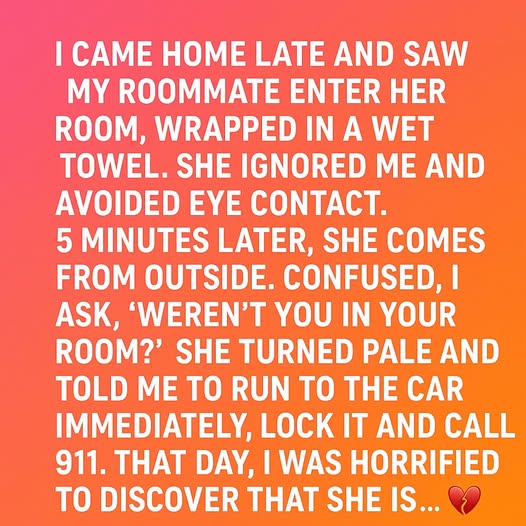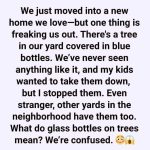I got home later than usual that night, the kind of late where the hallway lights in our building had already switched to that dim, sleepy setting and the elevator groaned like it resented doing one more trip. I was bone-tired—two meetings had run long, the train was delayed, and my phone was at 3%. I was thinking about leftovers and the soft, mindless salvation of a hot shower.
Our place sits at the end of the hall, the corner unit with the cheerful doormat my roommate, Maya, bought that says HI, I’M MAT. I had my keys in my hand when I heard the quick shush of bare feet on laminate. Our door cracked open. For a second, all I saw was white terrycloth and a flash of wet calf. Maya—dark hair wrapped in a towel, body in another—slipped past the gap and into her room, fast. She didn’t look at me. No “hey.” Just the soft clap of her door.
It pinged something small but sharp inside me. Maya is a talker. She narrates her life like a podcast: “Got the good tomatoes at the bodega,” “Office AC is set to arctic again,” “I’ve decided I’m in my scarf era.” Even when she’s annoyed, she mutters theatrically. Seeing her glide by without eye contact felt… off. But I was exhausted. The brain does this neat trick where it chooses the explanation that lets you go on autopilot. She’s tired. She’s cold. Don’t be weird.
I locked our door, slid my shoes off, and was halfway to the kitchen when the front door opened behind me.
Keys jangled. The deadbolt swiveled. The door swung wide. Maya stepped in—fully dressed in the same deep green blazer she’d worn that morning, tote bag cutting a groove into her shoulder, cheeks reddened from the wind. “God, my bus driver had a personal vendetta against traffic lights,” she said, kicking her heel to loosen her shoe. She looked up. Froze. Saw my face.
“Weren’t you just in your room?” I asked, slowly, like if I said it too fast it would make it true.
I watched the color drain from her. Not the embarrassed flush when you realize you forgot to text back, not the startled pink of being caught off-guard. Her pupils widened; her mouth did a small, involuntary tremor. Something primal, ancient, skittered down my spine. A wordless, animal knowing.
“Go wait in the car,” she said. It came out low and flat, like she’d taken the air out of the sentence on purpose. “Lock the doors. Call for help.”
My body moved before my brain argued. The tote bag slid off my shoulder. My hand found my keys. We backed into the hall together; she turned the deadbolt from the outside, quietly, like she was pinning a butterfly. We didn’t run. It felt important not to make sound.
The garage was two floors down. The elevator whined. I stared at our reflections in the mirrored panel—my face gone chalky, Maya’s jaw clenched, the green blazer suddenly a neon flag. She punched the car key fob like a heartbeat. The overhead lights strobed awake as we approached. I slid into the driver’s seat and locked the doors; Maya crouched at the bumper, peering up the ramp toward the street, listening.
My thumbs shook so hard I misdialed 911 once. The operator’s voice was brisk and warm. I gave our address, our unit number, tried to make my voice calm even as my breath insisted on stuttering. “We think someone’s inside,” I said. “We thought it was my roommate. But she just got home.”
“Stay in your vehicle. Officers are on the way,” the operator said. “Do you see anyone at your windows?”
I did that thing they do in movies—crouch in the seat to change the angle. Our living room curtains were half-closed; a smudge of light made a pale rectangle on the glass. I couldn’t see movement. The not-seeing felt like a presence all its own.
Maya tapped the window and I rolled it down an inch. “I forgot to tell you,” she whispered, breath making ghosts in the cold air. “The bathroom window sticks. If you jiggle it hard enough…”
My brain finally caught up. “You think they came in that way?”
“I think I keep trusting this building’s security,” she said, and a bitter little smile touched the corner of her mouth before evaporating. “And I think I saw something this morning. A man by the mailboxes, reading nothing, just… present.”
The sirens arrived softly, which feels like a contradiction until you’ve heard it—no dramatic wails, just quiet authority, the hum of radios. Two officers met us by the hood. Maya handed over our keys. “Is anyone else inside?” one asked. “Any pets?”
“No,” we said together.
“Stay put,” the other said, and I didn’t need convincing.
They moved like choreography—one at the front, one at the back stairwell. A third officer appeared from nowhere to cover the side alley. A minute stretched to two, then five. Radio voices crackled. The building, suddenly, sounded loud—pipes clanking, someone’s TV laugh track bleeding through the floor above us, a distant dishwasher cycling. I realized how much of “home” is just a familiarity with noise.
I don’t think I breathed until I saw the first officer reappear, our key ring swinging from his finger. “No one inside,” he said. “But your bathroom window latch is snapped, and there are damp footprints on the tile. The towel rod’s bent. Someone was there recently.”
Maya’s shoulders dropped a fraction. Mine didn’t. “Did you check the closets?” I asked, hating how small my voice sounded.
“All of them,” he said. “Under the bed, too. If he was there when you came down, he’s gone now.”
He offered to walk us back up. I didn’t want to go. Every instinct said: Let the locks be a mouth that never opens again. But it was our stuff. Our photos. The plants that drink from me in exchange for not dying.
Upstairs, the echo of our door opening made my ears ring. The living room looked normal, which suddenly felt like impudence. But the bathroom told the truth. The window hung at a crooked angle; the paint around the latch was gouged. There were wet ovals on the bathmat, lighter where a heel should’ve been, darker where weight had pressed. The good towel—the one we keep folded like a promise for guests—was slung on the floor, damp and wrung like someone had wiped themselves dry in a hurry.
The officer put on gloves and lifted the towel with two careful fingers. “We’ll dust the latch,” he said. “Make a report. Check the building cameras, if there are any worth a damn.”
“There’s a knife missing,” Maya said suddenly, voice tight. I turned. The magnetic strip over the sink—the one with our five cheap knives—had a gap like a missing tooth. Five spots, four blades. She pointed with her chin. “We don’t misplace those.”
The room tilted again. I held the counter because it suddenly felt like a thing that could hold me. The officer nodded without looking surprised and wrote it down.
We made statements at the little table where we eat takeout and mail rent checks. The officers were kind without being soft. They asked good questions. Had we noticed anyone following us home? Had we shared our address with any new service people? Had there been packages stolen recently? (Yes, actually. Two. We’d assumed porch pirates, shrugged, and replaced the shampoo and the candle. It seemed so small, then.) They told us to change the locks and to talk to management about the window. “It was probably a quick-in, quick-out,” one said. “Someone saw a chance. You startled him by coming home.” The “probably” was not comfort; it was honesty.
After they left, the apartment felt too loud and too quiet at once. The heater clanged alive like a ghost in the walls; the upstairs neighbor’s baby yelped. Maya went to her room and came back with a blanket, wrapping it tight around her like armor. We sat side by side on the couch, knees a precise, almost painful inch apart.
“What did you see?” I asked finally. “When you walked in.”
She swallowed. “I saw the towel the way I never wrap it,” she said. “I always tuck it in a V. This one was straight across. And I realized my hair wasn’t wet.” Her laugh was a small, broken thing. “And then I remembered I had the only set of keys, because yours are on that ugly keychain I bought you.” She nudged my astronaut keychain with her toe. “And then I remembered the sticky window and wanted to vomit.”
We slept at a friend’s place that night. Slept is generous. We lay on her pullout couch like two people who’d been shaken hard and were pretending we were still put together. In the morning, sunlight made rectangles on the floor and we looked like ourselves again but a little paler.
Building management replaced the bathroom latch and grumbled about “city kids leaving windows open.” We installed a security bar and swapped our locks for ones that thunked more decisively. We got a camera—not because it would stop anything, but because the red light made something in me unclench. For a while, I jumped at the ice maker. I kept shoes by the bed. I learned the precise pattern of Maya’s footsteps in the hall and could identify the neighbor’s by the second step.
Weeks passed. My nervous system found a new baseline. Sometimes I’d still stand in the bathroom, staring at the window, and think about the person who had stood there with my towel wrapped around their body like they belonged. What did they see? Our dirty mirror with the toothpaste comet. The small plant the internet swears thrives on steam. My cheap moisturizer, uncapped like always. It made my skin crawl. It also made me vigilant in the way that is, I suspect, a permanent change.
Here is what I carry from that night more than the fear: Maya’s voice, low and certain, telling me to go. The clarity of it. The command. The absence of apology. The way I didn’t debate, didn’t do that polite thing where you stay to be helpful and end up in trouble. I did what she said and lived in the pocket of her quick thinking. We were safe because we trusted the person who cared about us and the small flicker that said something isn’t right.
Home didn’t stop being home; it just became something we tended with more intention. We check the windows. We text when we’re on our way up. We learned our neighbors’ names. We listen to our own gut and to each other, even when it seems dramatic. Especially then.
Sometimes—on my way down the hall when it’s late, when the elevator groans and the lights hum—I think about the first moment, the towel swish and the door click, and feel the ghost of that cold wave. Then I unlock our door, and the place is ours again: plants leaning into the sun, shoes in a small pile, the stupid HI, I’M MAT doormat grinning like it knows how quickly life can turn and how good it feels to turn back toward safety together.


